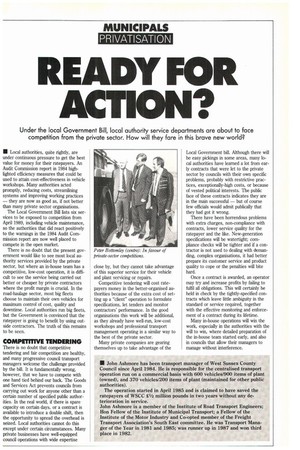READY FOR ACTION?
Page 49

If you've noticed an error in this article please click here to report it so we can fix it.
Under the local Government Bill, local authority service departments are about to face competition from the private sector. How will they fare in this brave new world?
• Local authorities, quite rightly, are under continuous pressure to get the best value for money for their ratepayers. An Audit Commission report in 1984 highlighted efficiency measures that could be used to attain cost-effectiveness in vehicle workshops. Many authorities acted promptly, reducing costs, streamlining systems and improving working practices — they are now as good as, if not better than many private sector organisations.
The Local Government Bill lists six services to be exposed to competition from April 1989, including vehicle maintenance, so the authorities that did react positively to the warnings in the 1984 Audit Commission report are now well placed to compete in the open market.
There is no doubt that the present government would like to see most local authority services provided by the private sector, but where an in-house team has a competitive, low-cost operation, it is difficult to see the service being carried out better or cheaper by private contractors where the profit margin is crucial. In the road-haulage sector, most big fleets choose to maintain their own vehicles for maximum control of cost, quality and downtime. Local authorities run big fleets, but the Government is convinced that the ratepayer is going to benefit by using outside contractors. The truth of this remains to be seen.
COMPETITIVE TENDERING
There is no doubt that competitive tendering and fair competition are healthy, and many progressive council transport managers welcome the challenge provided by the bill. It is fundamentally wrong, however, that we have to compete with one hand tied behind our back. The Goods and Services Act prevents councils from carrying out work for anyone other than a certain number of specified public authorities. In the real world, if there is spare capacity on certain days, or a contract is available to introduce a double shift, then the opportunity to spread the overhead is seized. Local authorities cannot do this except under certain circumstances. Many private businesses have well-equipped council operations with wide expertise close by, but they cannot take advantage of this superior service for their vehicle and plant servicing or repairs.
Competitive tendering will cost ratepayers money in the better-organised authorities because of the extra cost of setting up a "client" operation to formulate specifications, let tenders and monitor contractors' performance. In the good organisations this work will be additional, as they already have well-run, low-cost workshops and professional transport management operating in a similar way to the best of the private sector.
Many private companies are gearing themselves up to take advantage of the Local Government bill. Although there will be easy pickings in some areas, many local authorities have learned a lot from early contracts that were let to the private sector by councils with their own specific problems, probably with restrictive practices, exceptionally-high costs, or because of vested political interests. The public face of these contracts indicates they are in the main successful — but of course few officials would admit publically that they had got it wrong.
There have been horrendous problems with extra charges, non-compliance with contracts, lower service quality for the ratepayer and the like. New-generation specifications will be watertight; compliance checks will be tighter and if a contractor is not used to dealing with demanding, complex organisations, it had better prepare its customer service and product quality to cope or the penalties will bite hard.
Once a contract is awarded, an operator may try and increase profits by failing to fulfil all obligations. This will certainly be held in check by the tightly-specified contracts which leave little ambiguity in the standard or service required, together with the effective monitoring and enforcement of a contract during its lifetime.
Many in-house operations will win the work, especially in the authorities with the will to win, where detailed preparation of the in-house team started early, and also in councils that allow their managers to manage without interference.
• John Ashmore has been transport manager of West Sussex County Council since April 1984. He is responsible for the centralised transport operation run on a commercial basis with 600 vehicles/900 items of plant (owned), and 370 vehicles/200 items of plant (maintained for other public authorities).
The operation started in April 1985 and is claimed to have saved the ratepayers of WSCC £1/2 million pounds in two years without any deterioration in service.
John Ashmore is a member of the Institute of Road Transport Engineers; Hon Fellow of the Institute of Municipal Transport; a Fellow of the Institute of the Motor Industry and Co-opted member of the Freight Transport Association's South East committee. He was Transport Manager of the Year in 1981 and 1985; was runner up in 1987 and won third place in 1982.
































































































